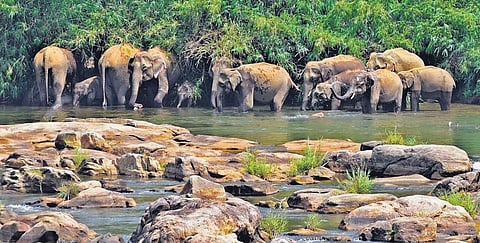

KOCHI: The notification issued by the Union Ministry of Environment, Forest and Climate Change, declaring around 3.81 lakh acres or 1,546 sq km of land around 22 protected wildlife sanctuaries as Eco Sensitive Zones or buffer zones has triggered unrest among the residents of high ranges across the state.
With assembly elections around the corner, the farmers’ associations are planning to release a charter of demands, resolving to form a vote bank. “We will cast our vote only in favour of the parties that accept and give an assurance on implementing the demands,” said Alex Chandy Ozhukayil, chairman of Kerala Independent Farmers’ Association (KIFA).
The recent announcement by Union Minister Prakash Javadekar in Parliament that the buffer zone was declared based on recommendation by the state government has put the ruling LDF on the backfoot, but Forest Minister K Raju’s office said the government has submitted a revised plan removing human habitations from the buffer zone and the Centre will issue a revised notification soon.
Though the draft notification was issued in 2016, the farmers were not aware of it till 2018, when the forest department submitted a revised recommendation to the Union government. The farmers had been protesting against the move from August 2020 after the Centre issued notification declaring 53.6 sq km of land around Malabar sanctuary as buffer zone. However, the protest gained momentum as notifications were issued for 21 other sanctuaries.
Chief Minister Pinarayi Vijayan wrote to Prime Minister Narendra Modi on February 7 seeking an amendment to the notification declaring 118.59 sq km of land around Wayanad Wildlife Sanctuary as Eco Sensitive Zone (ESZ). The state had submitted a revised recommendation on January 22 to reduce the buffer zone to 88.2 sq km, but the Centre issued the notification on January 28. “The buffer zone in Wayanad will be renotified and only plantations located in the forest fringe areas will come under the zone,” the minister clarified.
The notification prohibits commercial mining and quarrying, setting up of saw mills, polluting industries, commercial use of firewood, establishment of hydroelectric projects, use and production of hazardous products, tourism activities and discharge of effluents and solid waste into natural waterbodies. While the farmers are in support of banning quarrying activities and hazardous industries, the restrictions on agricultural activities have caused concern.
“While the authorities promise that there will not be any restriction on agricultural activities, the notification says agriculture, horticulture, dairy farming and aquaculture activities will be permitted only for local use. That means there will be restrictions on sale of agricultural products, which is the livelihood of the residents. What will be the fate of farmers cultivating rubber, cocoa, arecanut, coconut, banana, coffee and spices?” asked Alex Chandy.
According to him, the buffer zones will be brought under the Forest Conservation Act and sale of agriculture land, construction of houses, widening of roads, cutting trees and installation of mobile towers will be restricted. The notification says overhead power lines should be removed and underground cables encouraged.
Though there will be a monitoring committee under the wildlife warden, which is entitled to give relaxation in guidelines, eight of the 10 members are government officers and there are only two public representatives. The farmers will have to approach the district collector and divisional forest officer for permission each time, said Alex Chandy.
The notification also restricts movement of commercial vehicles during night hours. Autorickshaws, taxi cars, pickup vans, trucks and buses fall under the category of commercial vehicles, which the farmers depend on for transportation of goods and commutation. There are restrictions on poultry and pig farming and cattle rearing. The farmers will not be allowed to sink a well for non-agriculture purpose, he said.
Activities prohibited in eco-sensitive zones
Prohibited
Regulated activities